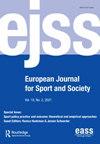Understanding Russia’s identity through Olympic ceremonies
IF 1
Q2 HOSPITALITY, LEISURE, SPORT & TOURISM
引用次数: 1
Abstract
Abstract This paper focuses on the comparative (mis-)interpretation of the 1980 Moscow and 2014 Sochi Olympic ceremonies by media outlets located in Great Britain and the USA, Russia’s ‘significant others’. Further, the paper attempts to uncover the most persistent facets of Russia’s identity – by decoding culturally-specific meanings of the signs and symbols in both ceremonies – and to trace which aspects of its national narrative Russia had to let go eventually in the course of the 34 years that separate the two Olympics. This is undertaken by a documentary analysis of ‘Western’ media between the periods of 20 July and 6 August for Moscow and 7–23 February for Sochi – time frames when the direct coverage of the ceremonies took place. Our key findings suggest that instead of enabling Russia to validate a new national identity and image the Western media only helped to reproduce resilient reciprocal national identities. Furthermore, it was the Sochi Olympics as Russia's biggest soft power party to date, not the aftermath, which, not least through a transformative attendant media response/framing from both sides, became the closing chapter of the Russian-Western interdependent identity construction in the early 21st century. Thus, apart from placing the spotlight on Russia’s evolving identity and interests, this paper also investigates how the USA’s and the UK’s media resisted Russia’s (Soviet) soft power strategy, whilst in the process solidifying their own identities and promoting their strategic narratives.通过奥运仪式了解俄罗斯的身份
摘要:本文关注的是俄罗斯的“重要他人”——英国和美国的媒体对1980年莫斯科和2014年索契奥运会开幕式的比较(错误)解读。此外,本文试图揭示俄罗斯身份最持久的方面——通过解码两个仪式中标志和符号的文化特定含义——并追踪在两届奥运会分开的34年期间,俄罗斯最终不得不放弃其国家叙事的哪些方面。这是通过对莫斯科的7月20日至8月6日和索契的2月7日至23日期间的“西方”媒体进行的文献分析进行的,这是直接报道仪式的时间框架。我们的主要发现表明,西方媒体并没有使俄罗斯能够验证新的国家认同和形象,而是帮助再现了具有弹性的互惠国家认同。此外,索契冬奥会是俄罗斯迄今为止最大的软实力盛会,而不是冬奥会的后果,尤其是通过随之而来的双方媒体的变革性回应/框架,成为21世纪初俄罗斯与西方相互依存的身份建构的最后一章。因此,除了关注俄罗斯不断演变的身份和利益之外,本文还研究了美国和英国的媒体如何抵制俄罗斯(苏联)软实力战略,同时在此过程中巩固自己的身份并促进其战略叙事。
本文章由计算机程序翻译,如有差异,请以英文原文为准。
求助全文
约1分钟内获得全文
求助全文
来源期刊

European Journal for Sport and Society
HOSPITALITY, LEISURE, SPORT & TOURISM-
CiteScore
3.30
自引率
4.20%
发文量
17
 求助内容:
求助内容: 应助结果提醒方式:
应助结果提醒方式:


